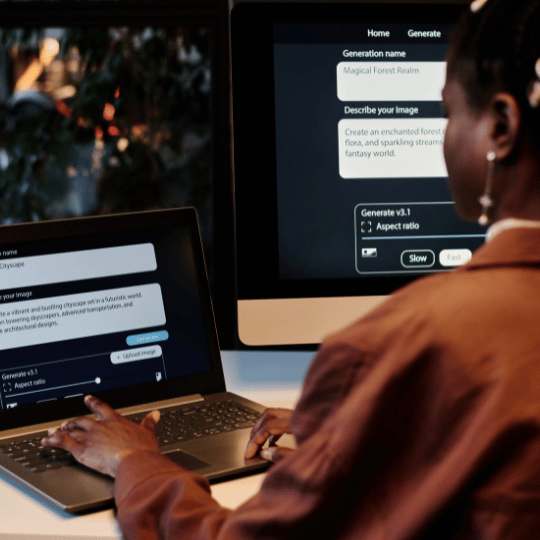Internship insights & advice: real experiences of KBS students
Internships are a stepping stone from student life to professional success. It is a chance to put theory into practice, bridge the gap between study and work, build local work experience and gain real-world skills.
In this blog, we will provide internship insights and advice and students at Kaplan Business School (KBS) - who completed academic internships at different organisations - will share their personal experiences.
Why internships matter
Whether it’s in business, business analytics, information technology or another industry, internships offer practical insights that go beyond the classroom environment. There are many reasons to complete an internship such as:
- Applying what you learned in class to a real workplace
- Gaining real-world knowledge and industry experience
- Opportunities to work with experienced professionals
- Learning the latest technical skills
- Developing new soft skills
- Exploring different career paths
- Gaining a mentor
- The possibility of ongoing employment and
- Building your professional network

“What I enjoyed most [about my internship] was being part of a friendly and professional team where I could really learn by doing. I loved applying what I’d studied in real-life situations and working on tasks that mattered. The supportive environment made it fun and helped me learn a lot along the way.”
~ Moe, Bachelor of Business (Accounting), interned at Primal Accounting

“The internship transformed abstract knowledge into practical experience. I gained firsthand experience in enterprise-level IT support and infrastructure management. It exposed me to cloud-based systems like Intune, Azure, and Power Platform workflows. I had the chance to lead small deployments and contribute to real projects, not just observe. I was later offered a job in System Administration, which I accepted. I am now transitioning to be an Operations Manager.”
~ Pierre Montanov, Master of IT (Extension), interned at Work Reimagined

“Internship helps you get your foot in the door to the industry. You get first-hand experience and great references. It might be intimidating and scary at first but if you’re open to learning new things and having new experiences then I suggest completing one.”
~ Christine Anne Dulay, MBA (Tourism & Hospitality Management), interned at Atura Adelaide Airport
Overcoming challenges
Stepping into a new work environment can be intimidating. International students may face challenges such as language barriers, cultural differences, adjusting to workplace norms, speaking confidently in team meetings and balancing work with study.
Here are some strategies to overcome challenges during your internship.
Learn and seek feedback
In your first week at the internship, you may feel overwhelmed by new tasks or work jargon. Remember that you are not expected to know everything. Internships are an opportunity to learn and grow. Ask as many questions as you need and seek feedback, guidance and support from your manager or other team members. Most professionals are willing to share their knowledge with someone who shows genuine interest and dedication.

“One of the challenges for me was adapting to accounting software in a short period, since I had no prior work experience. While most accounting systems share similarities, each has different interfaces and functionalities. Meeting tight deadlines was another challenge, especially during month-end tasks. I persevered and with guidance from my supervisor, I managed to complete my tasks successfully and grow through the experience.”
~ Moe

“Adapting quickly to unexpected technical issues required initiative and problem-solving. I overcame this by asking my manager questions, reverse-engineering existing processes and creating clear documentation.”
~ Pierre
Adapt to workplace culture
Workplace culture is different to an educational learning environment. You need to adapt quickly to new business procedures and team dynamics. To do this, research Australian work etiquette, observe how your team communicates and collaborate, introduce yourself to people from other departments and join team activities.
Every day could bring a new set of challenges. The important thing is to have a positive attitude, a willingness to learn, put forward solutions and stay calm under pressure. Developing resilience will help you navigate challenges, improve your well-being and enhance your ability to perform effectively during stressful situations.

“Working in a culturally diverse team far from home exposed me to different communication styles, work ethics and expectations. It made me more adaptable, empathetic and resilient. I learned to listen carefully, ask questions and manage my time so that I could deliver at work while still meeting my academic commitments.”
~ Pierre
Networking
During your internship, you get to work with professionals who may have years of local work experience. Make an effort to connect with your colleagues at all levels of the organisation and engage in meaningful conversations. They can provide support and guidance throughout your career.

“I enjoyed being given the space to solve problems creatively. There was a real satisfaction in seeing a script I wrote cut hours of repetitive work for a colleague, or hearing appreciation from someone in finance because their report now runs automatically. I enjoyed the camaraderie within a diverse team and the sense that everyone was learning together.”
~ Pierre
Time Management
Balancing work with study and other personal responsibilities can be challenging. To produce quality work and meet deadlines, you need to set realistic goals, prioritise tasks and break them into more manageable steps as well as create a schedule that balances, study, work, personal commitments and time for rest.
Learning new skills
Stepping into a work environment will give you opportunities to develop a wide range of real-world skills in addition to the foundational skills you develop during your studies. You will gain new industry and technical knowledge and develop essential soft skills that will help you advance your career.
Examples of real-world skills
Skill Area
Professionalism
Communication
Collaboration
Technical
Problem solving
Personal Development
Key Skills
Time management, workplace etiquette, accountability
Written, verbal (presenting), active listening
Teamwork, conflict resolution, cultural sensitivity
Industry tools, software, project management
Critical thinking, creativity
Confidence, career clarity, adaptability

“I became more confident in communicating in a professional setting. I learned how to manage time efficiently, meet deadlines, and apply accounting standards in real-world situations. Technically, I improved my skills using SAP, Excel and Xero, processed financial transactions, and performed reconciliations. I also developed soft skills such as communication, teamwork, time management, and attention to detail.”
~ Moe

“I have learned to navigate through Micros Opera - a system that many hotels use to keep track of guest profiles, reservation bookings, room availabilities, room rates and other information crucial to running a hotel. I have improved my customer service skills, built guest rapport and become more confident in dealing with different scenarios to improve customer satisfaction.”
~ Christine
Advice for future interns
If you’re thinking about completing an internship or will be starting one soon, here are some useful tips to help you make the most of your internship experience.
Show up with a positive attitude
Your enthusiasm and willingness to learn will be appreciated. Be punctual, approachable and engaged. Always ask questions to expand your knowledge or clarify tasks.

“Have a willingness to learn, ask questions, stay curious and be proactive. Even small tasks offer big lessons. Punctuality, professionalism and a positive attitude will go a long way in shaping your experience.”
~ Moe

“Approach each day with enthusiasm. Always be ready for anything, show initiative and that you are ready to take on the job. Act as a regular employee; don’t think of it as just an internship.”
~ Christine

“Treat your internship like a testing ground, not a ‘box-ticking’ exercise that lacks engagement. Come prepared, curious and ready to contribute. Ask questions, find gaps and look for ways to add value. If you make a mistake, own it, fix it and learn from it. Document everything, because your teammates and future self will thank you. Build relationships across the organisation; a quick coffee chat can teach you more than a lecture. Finally, pace yourself as consistency beats burnout, and your wellbeing matters as much as your output.”
~ Pierre
Take notes and stay organised
It’s easier to remember things and stay on track if they’re written down. Keep a notebook or digital document (e.g. Microsoft notes) to record tasks, advice and feedback. Track the projects you’ve contributed to and your key achievements as they can be included in your resume or future job interviews.

“On my first day, I felt a mix of excitement and nervousness. I prepared by researching the company’s website to understand its background, services, and team members. I also ensured I was dressed professionally, arrived early, and brought a notebook and pen to take notes and ask relevant questions.”
~ Moe
Communicate clearly
Update your manager on your progress regularly. If you’re unsure about something, speak up early to ensure you complete the task correctly and it will help gain trust from your colleagues.

“Every member of the staff wants to see that you are open to being taught and not afraid to take on challenges. I relied on my colleagues and duty managers for guidance and support. After a time of working with them, they started to trust that I could handle some tasks on my own. It was a huge encouragement boost for me and helped me believe that I have the skills to succeed in this industry.”
~ Christine
Be proactive
If you’ve finished your task early, ask your manager for more or if there are any new projects you can be involved in.

“I initially focused on completing my assigned tasks, but when I noticed there were gaps in workflows, I proactively designed a plan and strategy to add value by improving internal processes. I presented it to my supervisor and discussed the next steps. This initiative showed my ability to contribute beyond the original scope of my role. As a result, I was gradually entrusted with more complex responsibilities, ranging from solving technical issues to addressing organisational and operational challenges. This trust led to the company offering me a position at the end of my internship.”
~ Pierre
Be open to feedback
Constructive feedback will help you learn and improve. You can ask your manager for feedback halfway through the internship to allow time for improvement.
Success tips for a great internship experience
Tip
Be punctual and reliable
Stay curious and ask questions
Communicate clearly
Take initiative
Listen to feedback
Document your achievements
Reflect on your growth
Network with colleagues
Why it works
Shows professionalism and respect
Reveals a willingness to learn and be clear on your tasks
Keeps your manager and team updated
Shows enthusiasm and leadership
Helps you grow and improve
Helps with future job applications
Builds confidence and direction
Builds your professional network / possible job lead
What’s next after the internship
Internships can help you decide on your next steps – whether it’s applying for part-time jobs, preparing for graduate roles, continuing or changing what you want to study or pursuing a new career path.
Transitioning from an intern to a job seeker is a critical step that requires reflection and planning. Below are steps you can take.
Reflect on your internship experience
List the technical and soft skills you developed, reflect on the feedback from your manager and team and identify projects you’re proud of. Ask yourself whether the internship confirmed your interest in the industry or role and what kind of company culture and work environment you prefer.

“The internship reinforced my passion for accounting. It helped me realise that I enjoy working with financial data and systems and confirmed my desire to pursue a long-term career in the field. It provided me with a clear understanding of professional expectations and allowed me to apply accounting knowledge in a practical context. I feel more prepared and confident to step into a full-time accounting role in the future.”
~ Moe

“The internship forced me to step away from the comfort of theory and solve messy, real-world problems within a diverse team. Navigating undocumented systems and shifting priorities sharpened my diagnostic skills, taught me to prioritise under pressure and gave me confidence in my technical judgement.
This experience confirmed that my career interests lean towards Artificial Intelligence in Modern Machine Learning and Logic, automation and eventually leading teams that bridge business needs with technical solutions.”
~ Pierre Montanov
Update your resume and LinkedIn profile
Highlight the impact of your internship work under ‘Work Experience’ in your resume. Use action verbs and quantify results, if possible (e.g. reduced processing time by 20%). Update your LinkedIn profile with your internship title, achievements and skills.
Secure a reference or recommendation
Before your internship ends, ask your manager if they could be your referee or write a letter of recommendation. You could also express your interest about work opportunities or extended contracts.

“When my internship was nearing its end, my duty managers told me that they loved working with me and were happy to be my future references. I was able to secure a guest service agent position at their sister hotel, Rydges Adelaide, because of my internship experience and my managers’ positive reviews. Overall, it was a very encouraging and supportive environment that I was glad and proud to be a part of.”
~ Christine
Connect with your teammates
Maintain relationships with people from your internship by connecting with them on LinkedIn or emailing them a thank you message.
Apply strategically for jobs
Define what roles you’re looking for, in which industries and locations. Tailor your cover letter and resume to the job description. If you do not have a lot of local work experience, use your internship and technical and soft skills you developed to demonstrate relevant experience.
Keep learning
If there’s a knowledge or skills gap between your internship and securing a job, you can take free online courses via educational platforms such as Coursera, LinkedIn Learning and Grow with Google.
Internships are an incredible opportunity to turn knowledge into action, build professional networks and gain confidence in the workplace. If you’re a current student thinking about doing an internship, learn from those who’ve completed one – the experience is very rewarding. Start with small steps – go see a careers advisor or look up internship opportunities online.
Interested in more career advice? Read our Business Career Guide. Learn more about academic internships at KBS.
You may also enjoy:









